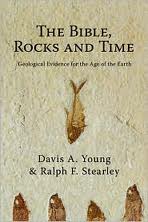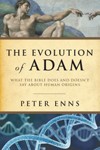In my last post we looked at one problem with Mohler’s theory that the cosmos was created to look billions of years old but is really only about 6000 years old (“apparent age”):
was created to look billions of years old but is really only about 6000 years old (“apparent age”):
It is an arbitrary solution that makes the facts fit the theory.
Today we will look at two more problems.
The world shows evidence of age and evolutionary development
The world does not just show evidence of age. It also shows evidence of millions upon millions upon millions of years of evolution, judging by the wealth of evidence at hand (e.g., fossils, geological records, human genome).
Mohler needs to account not only for why the cosmos looks old, but why the cosmos–including the earth and life on it–looks like it evolved.
 Mohler does not need to accept evolution to do this–just as he doesn’t need to accept an actually old earth. He could simply advance another ad hoc theory, that God created the universe, the earth, and all life as if they evolved: God created with “apparent evolutionary process.”
Mohler does not need to accept evolution to do this–just as he doesn’t need to accept an actually old earth. He could simply advance another ad hoc theory, that God created the universe, the earth, and all life as if they evolved: God created with “apparent evolutionary process.”
I am not sure how else Mohler could address this problem, other than simply rejecting the sciences, as does Ken Ham.
This raises the question, “How many ad hoc theories would one need to advance in order to preserve biblical literalism?” At what point do the ad hoc explanations begin to seem more like a stubborn defense rather than a true explanation of things?
It also raises some serious questions about God. Why would God do such a thing? Why would he load the cosmos with all this evidence and then expect his intelligent creatures, made in his image, to stop short of drawing some conclusions from that evidence?
I think this is a very serious issue. Mohler’s theory of “apparent age” gives us a God who makes the world look one way, but then expects us to hold all that at bay in favor of a literalistic reading of Genesis that, according to Mohler, God requires of us.
Is God—like a touchy tyrant—testing our allegiance to see if we will hold fast to his word? I think the Christian God is better than that.
Mohler is arbitrary in what portions of Scripture he reads “plainly”
As we’ve seen, Mohler rejects evolution and the age of the earth because his literal reading of the Bible demands it.
reading of the Bible demands it.
But Mohler cannot simply stop there. He must follow his own logic with respect to other biblical statements about the physical world that don’t line up with modern science. After all, if the Bible must be given the last word, then it must be given the last word consistently.
The biblical writers thought the earth was a flat disk. To follow Mohler’s logic, we must conclude that the world only looks round, since Scripture has the final word on the matter. Hence, God created the earth with “apparent roundness.”
Likewise, the Bible speaks of the sky overhead as a dome. Therefore, it can only appear that we have broken free of our atmosphere and orbited the earth, landed on the moon, and are moving further to the outer limits of our solar system daily. God created the cosmos with “apparent outer space.”
The Bible speaks of the earth as the stable, motionless, center of the cosmos. Therefore, it can only appear that the earth rotates on it axis, thus giving us day and night, or that the earth revolves around the sun, along with the other planets, on its yearly course. God created the solar system with “apparently heliocentricity.”
I know this may look like I am being unfair to Mohler. I do not mean to be. I am confident that Mohler does not believe that the earth is flat and stationary, or that there is no outer space. I am fairly certain he would read these examples as ancient ways of looking at the world–and he would be correct.
The question, though, is why Mohler places Genesis 1 on the “must read literally” side of the line and not on the “this is ancient idiom” side (as he does a flat, stationary, domed earth).
Mohler seems to feel free to decide what should and should not be read literally–the very accusation he levels at others. Of course, every reader of the Bible sooner or later makes these kinds of decisions. No one actually thinks God is a rock or a fortress, for example.
If Mohler were consistent, a literal reading of Genesis 1 would be as intolerable to him as a literal reading of those places where the Bible speaks of a flat, stationary earth with a dome overhead.
 Mohler speaks of “apparent age” with calm assurance. But it is a explanation that creates many more problems than it tries to solve. Those problems are rooted in Mohler’s unexamined precommitment that Christians have no choice but to read Genesis literally.
Mohler speaks of “apparent age” with calm assurance. But it is a explanation that creates many more problems than it tries to solve. Those problems are rooted in Mohler’s unexamined precommitment that Christians have no choice but to read Genesis literally.
They do have a choice, and Christians have been making it for a very, very long time.










